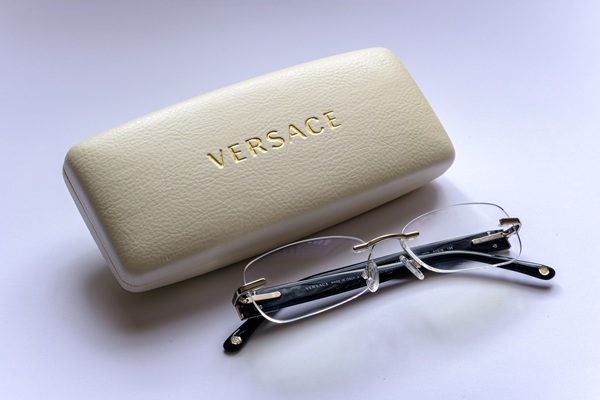When Would an Optometrist Recommend Corrective Lenses?

If you have never had corrective lenses, it is common to think you do not need them. It is, however, also common to find out that you need glasses or contacts later in life-- often after getting an eye exam for the first time in years. Difficulty seeing at night, trouble working on a computer, and frequent headaches are some reasons why people decide to book this exam. Fortunately, there is a solution. An optometrist may recommend corrective lenses to solve these vision problems and others like them.
About corrective lenses
Corrective lenses are clear lenses that change how light enters the eye to improve vision. They may come in the form of eyeglasses or contact lenses. Either way, an optometrist will create a custom prescription for each patient.
With glasses, this prescription is infused into clear lenses. Patients may have these lenses placed in any style of frame (round, square, etc.). Alternatively, there is no need for frames with contact lenses; the optometrist will have the prescription put directly into these transparent lenses that fit over the eye surfaces.
When to consider corrective lenses
According to the Vision Council,197 million people in the U.S. used some form of vision correction in 2021. However, many people do not know that they need glasses or contacts. This is especially true when a patient has had vision problems for years, or even their whole life, but has never had an eye exam. They may think that everyone sees the way they do. Some signs that a patient may have vision problems and should consider corrective lenses include:
- Objects nearby seem blurry
- Objects far away, such as road signs, seem blurry
- Has trouble seeing at night or adjusting to light changes
- Has dry or itchy eyes from eye strain
- Gets headaches or migraines from straining the eyes
- Vision becomes blurred by "halos" around lights
- Eyes become strained easily while reading or on digital devices
Vision problems that lenses can correct
Corrective lenses help with a variety of vision problems. In doing so, they also resolve the symptoms of poor vision listed above. For instance, patients will no longer need to strain their eyes to focus on objects nearby or far away, which relaxes the eye, eases dry eye, and prevents headaches. Essentially, wearing prescription lenses corrects the problem, not just the symptom.
Some of the most common vision problems corrected with lenses are nearsightedness and farsightedness. Nearsightedness, or myopia, is when a patient has trouble seeing objects far away; farsightedness, or hyperopia, is when objects nearby are hard to see. Corrective lenses may also help patients with astigmatism, a condition in which the lens of the eye is abnormally curved, resulting in blurred and wavy vision at any distance.
Choosing a type of corrective lenses
There are two types of corrective lenses: eyeglasses and contact lenses. Both can correct most types of vision problems. However, an optometrist would not recommend contacts to a patient with dry eyes because the eye needs a good amount of natural lubrication. Further, contacts cannot correct severe astigmatism. This aside, whether patients choose glasses or contacts typically boils down to personal preference.
When glasses are recommended
An optometrist may recommend glasses for patients who want a more affordable and convenient solution. With so many frame styles and colors, patients tend to have no problem finding frames that suit them. If they do, an optician can help and advise which frames fit which face shapes.
The maintenance of glasses is simple. Patients only need a microfiber cloth and a gentle, nonabrasive spray to keep them clean. If glasses become loose, the patient can return them to the optometrist's office for an adjustment. As long as their eyesight does not change, glasses can last for a year, two years, or longer.
When contacts may be a better option
Some patients do not like wearing glasses. Sometimes, they get in the way of a patient's job, hobby, or personal style. For these patients, an optometrist may recommend contact lenses. Since they simply fit over the eye, there is no need to worry about them at work or while playing sports. No one will notice them either, so they do not interfere with one's style.
Consult an optometrist
If you have been struggling with the symptoms of poor vision, corrective lenses may help you regain clarity. We provide both glasses and contacts. Call our Dallas office to schedule an appointment with an optometrist.
Request an appointment here: https://www.texasoptical.net or call Texas Optical at (214) 771-7333 for an appointment in our Dallas office.
Check out what others are saying about our services on Yelp: Read our Yelp reviews.
Recent Posts
The selection of eyewear feels significantly easier when the styles and craftsmanship of Versace eyewear enters the conversation, since bold lines and iconic detailing create an instantly recognizable look. Versace represents the intersection of Italian fashion and Greek mythos, blending confident glamour with symbolism through its signature Medusa logo. The brand is widely associated with…
Many people who work in construction or laboratories wear safety glasses to protect their eyes during the day. However, keeping your eyes safe extends beyond hazards in the workplace. There is a wide variety of household chores and hobbies for which you should wear eye protection. When used consistently, safety glasses help create a safer…
Transitions lenses combine style and convenience to support clear vision without switching between regular glasses and sunglasses. While they were often considered unfashionable in days past, times have certainly changed. Today, transition lenses can be fashionable, chic, and a reflection of your personal style. When designing a pair for you, an optometrist will look at…
Dry eye treatment is important when occasional irritation becomes ongoing discomfort that interferes with daily activities. Many individuals experience dryness, burning, or a gritty feeling in the eyes from time to time. However, when symptoms start to affect reading, screen use, or time outdoors, a structured approach to diagnosis and care helps protect comfort and…


